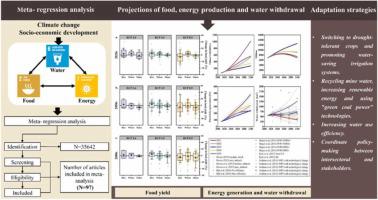Agricultural Water Management ( IF 5.9 ) Pub Date : 2022-05-13 , DOI: 10.1016/j.agwat.2022.107693 Xinxueqi Han , En Hua , Bernie A. Engel , Jiajie Guan , Jieling Yin , Nan Wu , Shikun Sun , Yubao Wang

|
In recent years, the impacts of climate change and socio-economic development on the water-energy-food nexus have been a hot topic. Forecasting future food and energy production and water withdrawal trends under a range of climate and socio-economic scenarios is a critical step for formulating agricultural, industrial, and environmental policy. However, published studies are imprecise due to the complexity of the changeable environment and nexus system. Here we conducted a systematic review and meta-analysis based on 97 studies (1253 observations) published before September 2021 to evaluate the effects of climate change factors on food yield and irrigation water, as well as the influence of socioeconomic development on energy production and water withdrawal. The study shows that the most serious impact of climate change on food yield occurred under the RCP8.5 scenario, with an average decrease of 1.73%, 4.17% and 4.56% in the 2020s, 2050s, and 2080s, respectively. Similar to the prediction of food yield, the irrigation water requirement of food production under the influence of climate change in the RCP8.5 scenario (12.22–18.01%) is higher than that in RCP4.5 and RCP2.6. Under the five socio-economic future scenarios, the average energy generation is projected to increase from 77.41 EJ (2010) to 334.11 EJ (2100). Water withdrawals for electricity generation range from 347 km3 (SSP1) to 1263 km3 (SSP5). Population and GDP were significantly and positively correlated with power generation and water withdrawal (P < 0.001). To some extent, increases in CO2 concentration and precipitation could compensate for the negative impact of rising temperatures on food yield. Climate change, as well as economic and social growth, will provide substantial challenges to the future water-energy-food nexus. In particular, the water resource risk at its core will create significant uncertainty in the future water-energy-food nexus. To ensure the security and stability of the nexus, we advocate for quick adoption of innovative technologies as well as a multi-sectoral, coordinated strategy for adaptation. We believe that the findings of this paper will provide effective and reliable data support for future policy formulation.
中文翻译:

了解气候变化和社会经济发展对水-能源-食物关系的影响:元回归分析
近年来,气候变化和社会经济发展对水-能源-食物关系的影响一直是热门话题。在一系列气候和社会经济情景下预测未来粮食和能源生产以及取水趋势是制定农业、工业和环境政策的关键步骤。然而,由于多变的环境和联系系统的复杂性,已发表的研究并不精确。在这里,我们基于 2021 年 9 月之前发表的 97 项研究(1253 项观察)进行了系统回顾和荟萃分析,以评估气候变化的影响粮食产量和灌溉用水的因素,以及社会经济发展对能源生产和取水的影响。研究表明,气候变化对粮食产量的影响最严重的是在RCP8.5情景下,2020年代、2050年代和2080年代平均下降幅度分别为1.73%、4.17%和4.56%。与粮食产量预测相似,RCP8.5情景下气候变化影响下粮食生产的灌溉需水量(12.22-18.01%)高于RCP4.5和RCP2.6情景。在五种社会经济未来情景下,平均发电量预计将从 77.41 EJ (2010) 增加到 334.11 EJ (2100)。发电取水范围从 347 km 3 (SSP1) 到 1263 km 3(SSP5)。人口和GDP与发电量和取水量呈显着正相关(P <0.001)。在一定程度上,CO 2的增加浓度和降水可以弥补气温上升对粮食产量的负面影响。气候变化以及经济和社会增长将对未来的水-能源-食品关系构成重大挑战。尤其是以水资源为核心的风险,将给未来的水-能源-食品关系带来很大的不确定性。为确保关系的安全性和稳定性,我们提倡快速采用创新技术以及多部门、协调的适应战略。我们相信本文的研究结果将为未来的政策制定提供有效和可靠的数据支持。











































 京公网安备 11010802027423号
京公网安备 11010802027423号